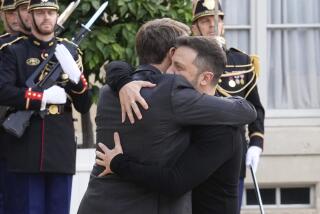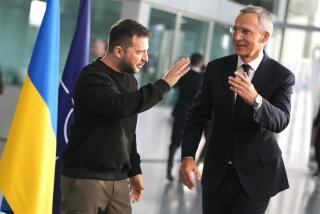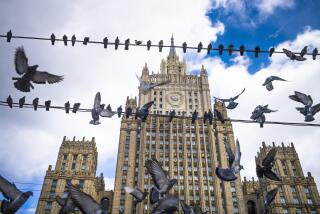Shultz Holds Marathon Talks in Moscow on Summit Agenda : Conference With Shevardnadze Goes On Nearly 8 Hours
- Share via
MOSCOW — Secretary of State George P. Shultz today held a marathon negotiating session with Soviet Foreign Minister Eduard A. Shevardnadze to plan the agenda for this month’s U.S.-Soviet summit meeting, which is expected to focus on arms control.
Shultz and Shevardnadze conferred nearly eight hours, meeting from noon, through a working lunch, until about 7:40 p.m. at the elegant Foreign Ministry annex here.
Rozanne L. Ridgway, U.S. assistant secretary of state for European affairs, refused to characterize the meeting or to say whether progress was made.
“We went through the whole agenda and everything on it,” she said.
Letter to Gorbachev
Shultz arrived with a letter from President Reagan to Soviet leader Mikhail S. Gorbachev, but its contents were not disclosed.
Shultz was to meet Tuesday with Gorbachev, whose call for a 50% reduction in American and Soviet nuclear weapons was followed by a new U.S. arms control offer announced by Reagan last Thursday.
Shultz planned to hold a news conference after meeting with Gorbachev and to leave Moscow on Tuesday night, said Ridgway and Bernard Kalb, the State Department spokesman.
Shultz told reporters before arriving in Moscow that the United States and Soviet Union are still “quite a difference apart” on strategic arms control issues.
‘Candid, Productive’
He said in a brief airport arrival statement that recent discussions with Shevardnadze in the United States were “candid and productive. I expect our meetings in Moscow will be that way as well,” he said. “I welcome this visit, and I hope it will be a productive one.”
Shevardnadze, who met the secretary at the airport, did not make any remarks.
Shevardnadze and Shultz shook hands before entering a marble hall at the Foreign Ministry annex to begin their talks. Shevardnadze told reporters, “I always expect results,” but he cautioned, “Don’t run ahead of events.”
Shultz was accompanied by 10 U.S. officials, including Robert C. McFarlane, the national security adviser; Paul H. Nitze, the principal U.S. arms control adviser, and Arthur A. Hartman, U.S. ambassador to Moscow.
Other Soviet Conferees
Representing the Soviets along with Shevardnadze were Deputy Foreign Minister Georgy Kornienko; arms control expert Yuli Kvitsinsky; the Soviet ambassador to Washington, Anatoly F. Dobrynin, and eight other officials.
The main stumbling block to an arms agreement remains a Soviet demand for a “total ban” on arms in space. A senior U.S. official, who spoke on condition that he not be identified, said the Soviet definition would encompass all U.S. attempts to “counter objects in space.”
It is aimed, he said, at stopping Reagan’s Strategic Defense Initiative, known as “Star Wars,” which envisages using high technology to develop defenses against attacking missiles.
The summit agenda is slowly taking shape, but the Soviets have so far resisted U.S. insistence they agree to discuss the human rights situation in the Soviet Union.
More to Read
Sign up for Essential California
The most important California stories and recommendations in your inbox every morning.
You may occasionally receive promotional content from the Los Angeles Times.













